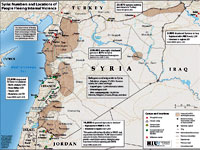Russia calls for second meeting of the Syria Action Group

(Russia Beyond the Headlines – www.rbth.ru – Ekaterina Zabrovskaya, Combined report – February 6, 2013)
Following a reported Israeli air strike on Syria in late January, the Russian Foreign Ministry has called for another gathering of parties in the Syria Action Group. Russia hopes to continuing working within the framework of the Geneva Communiqué, which was adopted at the last Action Group meeting.
Russia has called for a second meeting of the Syria Action Group, which is made up of five countries: two permanent United Nations Security Council members and some of Syria’s neighbors in the so-called Geneva-2 meeting.
“Russia reaffirms the need to call a meeting of the Action Group on Syria, Geneva-2,” Russian Deputy Foreign Minister Gennady Gatilov wrote in his micro-blog on Twitter.
The first meeting of the Action Group on Syria, held in Geneva on June 30, 2012, adopted the Geneva Communiqué, which recommends creating an interim government in the country to include all the parties. It also envisages the possibility of revising the Syrian constitution on the basis of a nationwide dialogue. After a new constitutional order is restored, multi-party elections would be held and new government bodies formed.
U.N. and Arab League special envoy to Syria, Lakhdar Brahimi, said during the consultations at the Security Council on Jan. 29 that the Geneva Communiqué of the Action Group needed to be clarified by weeding out ambiguous definitions. This applies, among other things, to the clause envisaging creation in Syria of “an interim government vested with full powers,” ITAR-TASS reported.
Commenting on the envoy’s proposals, Russian Foreign Ministry spokesman Alexander Lukashevich said that “Russia is prepared to discuss the whole range of issues connected with implementation of the Geneva document, including in relation to the obligations of external players.”
“To this end, we believe it is practicable to continue discussions within the framework of the Geneva Action Group,” Lukashevich was quoted as saying by Vzglyad.
Earlier, Gatilov said that Russia was ready to meet in any format. “There have been two meetings in a three-way format: Russia-U.S.-Brahimi,” he said. “We are discussing Syria at the Security Council, and we have proposed calling a second Action Group meeting the so-called ‘Geneva-2.'”
“Our aim is to discuss concrete implementation of the provisions contained in the Geneva Communiqué,” said Gatilov. “We believe it important to broaden the circle of participants by inviting other countries. They include Iran and Saudi Arabia. We consider them to be important players in the search for a settlement in Syria; they can make a positive contribution to this matter.”
The situation around Syria flared up again in late January. The Syrian Armed Forces Command announced that, on Thursday, Jan. 31, the Israeli Air Force attacked and destroyed a research center outside Damascus where chemical weapons are believed to be stored. As a result, heavy damage was inflicted, two members of staff were killed and five more wounded, the Syrian side reported.
The U.N. and NATO have yet to confirm reports about the air strike.
The Syrian ambassador to Lebanon, Ali Abdel Karim, has already declared that his country would retaliate against Israeli air strikes.
Experts believe that threats of retaliation by Damascus are mere rhetoric. In an interview with the newspaper Vzglyad, Professor Vadim Kozyulin of the Military Sciences Academy and director of the PIR Center conventional weapons project, said that a Syrian counterstrike would be suicidal for President Bashar Assad.
“Syria has a lot of missiles but they are quite obsolete. We are also mindful of the large number of chemical warheads the only serious threat to Israel. But I don’t think the Syrians would go ahead and deliver a chemical or missile strike. In that case, Israel would simply obliterate the country,” said Kozyulin.
The expert added that, in the event of a counterstrike, Syria “would lose its remaining allies, including Russia.” This is not the first time Israel has delivered a pre-emptive strike, Kozyulin noted.
“Think of Iraq or, indeed, Syria, when Israel destroyed a facility in 2007 that was later claimed to be a nuclear weapons research center. Think of the strike on the Yarmouk plant that was building rockets in Sudan,” Kozyulin said. “Each time Israel delivers such strikes, the first reaction is negative, but eventually everybody swallows the pill. So, nothing extraordinary will happen this time. The international reaction will be confined to condemnation.”
The conflict between the authorities and the armed opposition in Syria has been going on since March 2011, having claimed about 60,000 lives, according to U.N. statistics.
This article is based on materials from ITAR-TASS, Vzglyad, Rosbalt and RIA Novosti.
Article also appeared at: http://rbth.ru/international/2013/02/06/russia_calls_for_second_meeting_of_the_syria_action_group_22551.html
